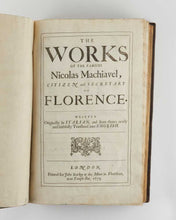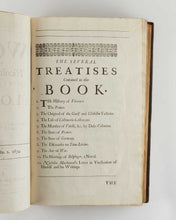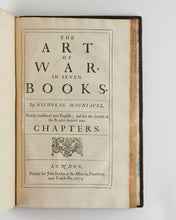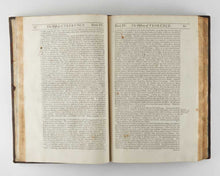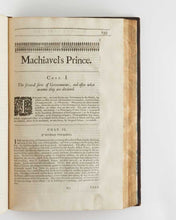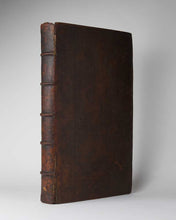
MACHIAVELLI, Niccolò. The works of the famous Nicolas Machiavel, citizen and secretary of Florence. Written originally in Italian, and from thence newly and faithfully translated into English. London: printed for John Starkey at the Miter in Fleetstreet, near Temple-Bar. 1675.
Folio. Contemporary mottled calf, double-fillet border in blind to boards, spine with raised bands blind ruled in compartments, marbled edges, vellum guards; pp. [24], 177, 188-189, [5], 199-262, 265-267, [5], 267-314, 317-431, [6], 434-529, [23]; woodcut ornaments to titles, woodcut initials, typographic headpieces (this the variant without the engraved portrait of the author); hinges cracked but holding firm, upper and lower joints splitting, light rubbing to boards and spine with a few small abrasions, corners and spine ends a little worn; the odd mark, else very clean and crisp, an exceptional copy preserved in a very good contemporary binding.
The first issue of Henry Neville’s handsome edition of Machiavelli’s writings, the first collected works to appear in English translation, its scope allowing, for the first time, a balanced, judicious overview of the Florentine’s enigmatic theories of power, diplomacy and – not least – war, “the only profession worthy of a Prince”.
Although the writings of Niccolò Machiavelli (1469-1527) have, for over five centuries, been central to theories of power, diplomacy, political and military strategy, and indeed the arts of war (to adapt the title of the first of the works to be published separately in English), there is still “disagree[ment] concerning his overall intention, the status of his sincerity, […] his piety, the unity of his works, and the content of his teaching” (IEP). Dedicated to Lorenzo di Piero de' Medici, Il Principe (The Prince) offers unflinching advice for assuming and retaining power (by ruthless means, if necessary), while the Discorsi sopra la prima deca di Tito Livio (Discourses on the First Ten of Titus Livy) advance a broadly republican model, in which a leader is constrained by constitutional checks and limits. Written around 1513, Il Principe remained unpublished until 1532, and in 1559 was banned and added to the Index Librorum Prohibitorum. Although England was no longer subject to papal decree, Machiavelli’s ideas were deemed sufficiently dangerous that the ban extended to an unofficial refusal to license any printing or translation of Il Principe and the Discorsi (though Italian editions clearly circulated, some printed under false imprints). An English Art of War – the only major work Machiavelli published during his lifetime (in 1521) – was issued in 1563, the translation by Peter Whitethorne dedicated to Queen Elizabeth, but Il Principe did not appear until 1640, following the Discorsi in 1636.
Henry Neville (1620-1694), the editor and translator of this first complete English Machiavelli was born into a prominent Berkshire family. Following studies at Merton College, Oxford, he travelled widely in Europe, an experience which helped to shape his political views. An unswerving advocate of republicanism before, during, and after the Civil War (though later an outspoken critic of Cromwell’s Protectorate), he was elected as Member of Parliament for Abingdon in 1645. He was later briefly imprisoned in the Tower of London for his alleged involvement in the 1663 Farnley Wood Plot, or "Yorkshire rising", a failed attempt to overthrow the recently restored monarch.
Neville published a number of satirical works, political broadsides and, in 1681, Plato Redivivus, a fictional dialogue urging political reform and clearly indebted to Machiavellian theories of government (favouring a mixed constitution and engaged citizenry to foster and preserve liberties). His pioneering edition of Machiavelli sought to (re)introduce the works to an English readership still reeling from the turbulence of Civil War and Restoration. In addition to fresh translations of The Prince and Discourses, there are, among other works, newly condensed versions of The History of Florence and The Art of War (The State of France and The State of Germany appear here for the first time in English). The edition is notable for its inclusion of the “Letter to Zanobius Buondelmontius”, in which a fictional “Machiavelli” (most likely Neville himself) defends himself against accusations of atheism and “teaching Subjects how they should Rebel and conspire against their Princes” (Buondelmonti, Machiavelli’s friend, was one of the dedicatees of the Discourses, and an interlocutor in the dialogue of The Art of War). Offering timely insights into the dark arts of power, as well as the benefits of constitutional balance, Neville’s Machiavelli redressed prevailing (and distorted) views of Machiavelli’s thinking, and reshaped English perceptions of these great works.
In addition to the present edition, ESTC records a further edition, also issued in 1675, with the imprint “for J. S., [presumably John Starkey] to be sold by Robert Boulter at the Turks-head in Cornhil, against the Royal Exchange, 1675” (R180243). Both, according to the title-page verso, were licensed on February 2, 1674. The present edition, “printed for John Starkey at the Miter in Fleetstreet” appears to be the first issue. Both versions include the publisher’s catalogue bound at the back of the book (3z2-4) with the Fleet Street address.
See: Felix Raab, The English Face of Machiavelli: A Changing Interpretation 1500-1700 (London: Routledge & Kegan Paul, 1964); The Internet Encyclopaedia of Philosophy (online).
ESTC R19906
#2122421






